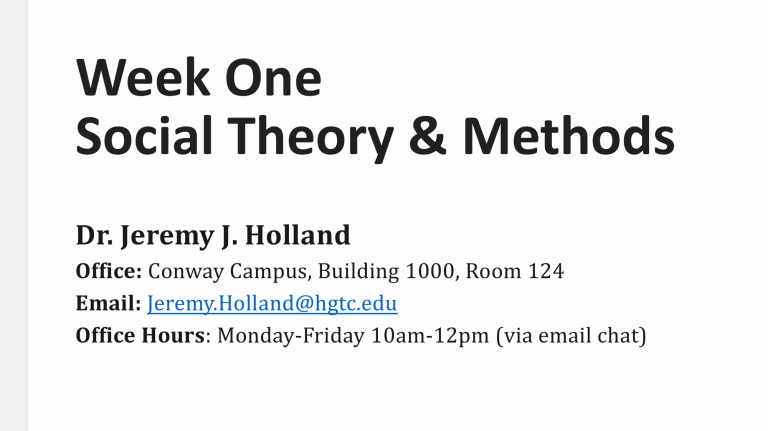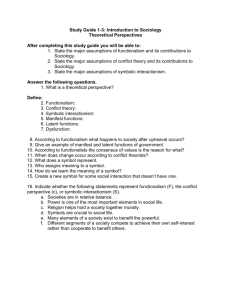
Week One Social Theory & Methods Dr. Jeremy J. Holland Office: Conway Campus, Building 1000, Room 124 Email: Jeremy.Holland@hgtc.edu Office Hours: Monday-Friday 10am-12pm (via email chat) Question to Ponder… How many Social Institutions can you list? Sociology Defined The study of human groups and societies, giving particular emphasis to analysis of the industrialized world. Origins of Sociology • • • • • • • Renaissance (1350) Reformation (1517) Enlightenment (1700) Industrial Revolution (1750) American Revolution (1776) French Revolution (1789) Birth of Sociology (1800s) What is the Sociological Imagination? History Biography Society C. Wright Mills coined the term in 1959 Mills said we must understand the connection between historical events, societal patterns, and individual biographies (i.e. social context) The American Dream as Cultural Myth Personal Troubles Difficulties that are located in individual biographies and their immediate milieu. Public Issues Difficulties or problems that are linked to the institutional and historical possibilities of social structure. Acceptance of Refugees by Gender, Race, Age, Education, and Religion Three Sociological Perspectives 1.Functionalism 2.Conflict Theory 3.Symbolic Interactionism Perspective One: Functionalism This perspective looks at the functions of groups, systems and institutions in society, much like the organs in a body have functions needed for a body’s survival. General Tenets: 1. Systems are made up of parts. 2. The parts of the system work together for the good of the system. 3. If one part of the system changes, other parts will change as well. Founder of Functionalism: Emile Durkheim • Manifest functions are the functions of a particular social activity that are known to and intended by the individuals involved in the activity. • Latent functions are the functional consequences that are not intended or recognized by the members of a social system in which they occur. • Examples: • • • • • Rain Dance & Communal Ritual Gambling & Underground Economy Poverty & Social Workers For-Profit Prisons & Incarceration Religious Community & Suicide Rates Are we socially constrained or are we free? Social Determinism Human Agency Free Will Perspective Two: Conflict Theory This perspective concerns the struggle over resources, by two primary classes (i.e. Owners & Workers). General Tenets: 1. People have basic economic interests they want to acquire. 2. Some groups have more power (dominant group) to get what they want than the other group (subordinate group). This division has been analyzed in terms of class, race, and gender. 3. Some groups use ideas to get/maintain resources (i.e. ideology). Only the dominant group has the means to impose their ideology on society. Founder of Conflict Theory: Karl Marx Historical Materialism: Theory that the economic system of a given society influences everything else about that society, including cultural values and social structure. He believed social change (e.g. biological, psychological, social, historical, and cultural) occurs due to changes in the economy. Dialectical Process: All systems have an internal contradiction that produces tension within the system (i.e. Thesis, Antithesis, Synthesis). Ideology, Power, & Access Ideology: A set of ideas produced by the dominate class intended to maintain its economic advantage over the subordinate class. • Ideology represents the interests of the dominant class. • Ideology represents a distorted view of reality . • • (i.e. false consciousness vs. class consciousness) Ideology is constraining. Access: Ideological power relies on privileged access to means of mass communication (e.g. Arab Spring, social media algorithms). Media institutions therefore yield ideological and persuasive power and play a key (mediatory) role in manufacture of consent . Social elites (politicians, corporations …) have influence over, and access to, mass media. 'June 4th Incident' (Tiananmen Square 1989) Images of the protest on the Internet have been censored in China. To this day, Chinese authorities don’t allow open discussion of the so-called “June 4th incident,” in the media or on the internet. When students at the Beijing University, where all the protests started, were shown copies of the iconic photograph 16 years afterward, they “were genuinely mystified.” Some of them believed the images to be fake. http://www.pbs.org/wgbh/pages/frontline/tankman/interviews/wong.html 'June 4th Incident' (Tiananmen Square 1989) https://www.nbcnews.com/video/what-happens-when-you-google-tiananmen-square-in-china-273675331595 Perspective Three: Symbolic Interactionism As opposed to the other two perspectives, SI is considered a micro-approach because it highlights the role of the individual. Symbolic Interactionism looks at: 1. Shared symbols, which are the basis for an individual perceiving his/her “self.” 2. These symbols, especially language, account for the interplay between an individual’s internal thoughts and social behavior. Founder of Symbolic Interactionism: George Herbert Mead Stages of Socialization: 1. Pre-play: Gestures of the infant have no meaning because the infant has no language. 2. Play Stage: Start to mimic another’s behavior, and use imagination (e.g. mail carrier). 3. Game Stage: Requires understanding many other roles at the same time (e.g. baseball) 4. Generalized Other: Indicates that the person is able to imagine him/herself from the view of people in general (e.g. women, American). This is also the stage we reach the ability to understand how others see the world. Sociological Research Methods Types of Research Questions Steps of the Research Process Types of Research Methods Qualitative Methods • Often rely on personal and/or collective interviews, accounts, or observations of a person or situation Quantitative Methods • Draw on objective and statistical data and often focus on documenting trends, comparing subgroups, or exploring correlations Three Methods Used in Social Research Experiments on Race 1. 2. 3. 4. https://fod.infobase.com/p_ViewVideo.aspx?xtid=186715 Race Face Effect Shooter Task Ambiguous Situations Doll Task Sociological Interviews Structured: The interviewer has a rigorous set of questions which does not allow the person being interviewed to divert. Semi-structured: The interviewer has questions but is openended, allowing new ideas to be brought up during the interview as a result of what the interviewee says. Interview Questions on Education Questions for Review 1. What are the main historical events that led to the emergence of sociology as a discipline? 2. What is the “sociological imagination”? 3. What are the three main perspectives sociologists use? 4. What is the difference between personal troubles and public issues? 5. In Functionalism, what are manifest and latent functions referring to? 6. In Critical Theory, what is meant by the terms ideology and access? 7. In Symbolic Interactionism, what are the four stages of socialization?

